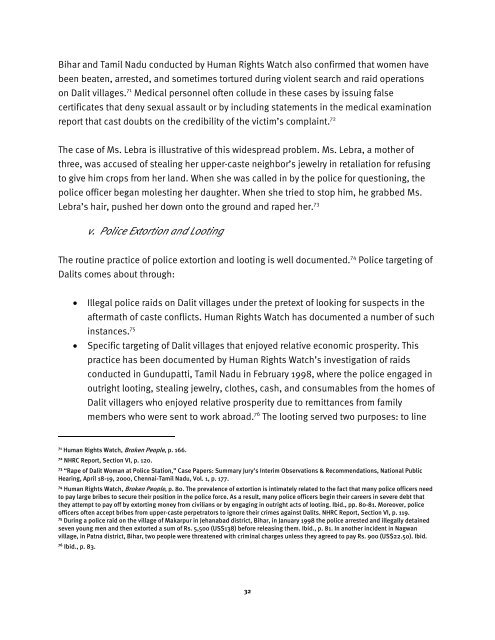Caste Discrimination against India's âUntouchablesâ - Human Rights ...
Caste Discrimination against India's âUntouchablesâ - Human Rights ...
Caste Discrimination against India's âUntouchablesâ - Human Rights ...
Create successful ePaper yourself
Turn your PDF publications into a flip-book with our unique Google optimized e-Paper software.
Bihar and Tamil Nadu conducted by <strong>Human</strong> <strong>Rights</strong> Watch also confirmed that women have<br />
been beaten, arrested, and sometimes tortured during violent search and raid operations<br />
on Dalit villages. 71 Medical personnel often collude in these cases by issuing false<br />
certificates that deny sexual assault or by including statements in the medical examination<br />
report that cast doubts on the credibility of the victim’s complaint. 72<br />
The case of Ms. Lebra is illustrative of this widespread problem. Ms. Lebra, a mother of<br />
three, was accused of stealing her upper-caste neighbor’s jewelry in retaliation for refusing<br />
to give him crops from her land. When she was called in by the police for questioning, the<br />
police officer began molesting her daughter. When she tried to stop him, he grabbed Ms.<br />
Lebra’s hair, pushed her down onto the ground and raped her. 73<br />
v. Police Extortion and Looting<br />
The routine practice of police extortion and looting is well documented. 74 Police targeting of<br />
Dalits comes about through:<br />
• Illegal police raids on Dalit villages under the pretext of looking for suspects in the<br />
aftermath of caste conflicts. <strong>Human</strong> <strong>Rights</strong> Watch has documented a number of such<br />
instances. 75<br />
• Specific targeting of Dalit villages that enjoyed relative economic prosperity. This<br />
practice has been documented by <strong>Human</strong> <strong>Rights</strong> Watch’s investigation of raids<br />
conducted in Gundupatti, Tamil Nadu in February 1998, where the police engaged in<br />
outright looting, stealing jewelry, clothes, cash, and consumables from the homes of<br />
Dalit villagers who enjoyed relative prosperity due to remittances from family<br />
members who were sent to work abroad. 76 The looting served two purposes: to line<br />
71<br />
<strong>Human</strong> <strong>Rights</strong> Watch, Broken People, p. 166.<br />
72<br />
NHRC Report, Section VI, p. 120.<br />
73<br />
“Rape of Dalit Woman at Police Station,” Case Papers: Summary Jury’s Interim Observations & Recommendations, National Public<br />
Hearing, April 18-19, 2000, Chennai-Tamil Nadu, Vol. 1, p. 177.<br />
74<br />
<strong>Human</strong> <strong>Rights</strong> Watch, Broken People, p. 80. The prevalence of extortion is intimately related to the fact that many police officers need<br />
to pay large bribes to secure their position in the police force. As a result, many police officers begin their careers in severe debt that<br />
they attempt to pay off by extorting money from civilians or by engaging in outright acts of looting. Ibid., pp. 80-81. Moreover, police<br />
officers often accept bribes from upper-caste perpetrators to ignore their crimes <strong>against</strong> Dalits. NHRC Report, Section VI, p. 119.<br />
75<br />
During a police raid on the village of Makarpur in Jehanabad district, Bihar, in January 1998 the police arrested and illegally detained<br />
seven young men and then extorted a sum of Rs. 5,500 (US$138) before releasing them. Ibid., p. 81. In another incident in Nagwan<br />
village, in Patna district, Bihar, two people were threatened with criminal charges unless they agreed to pay Rs. 900 (US$22.50). Ibid.<br />
76<br />
Ibid., p. 83.<br />
32

















